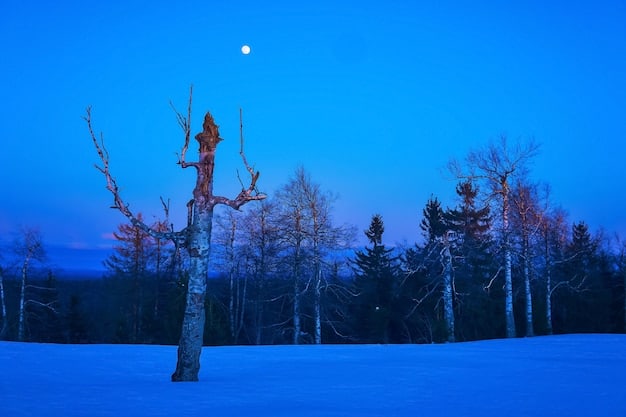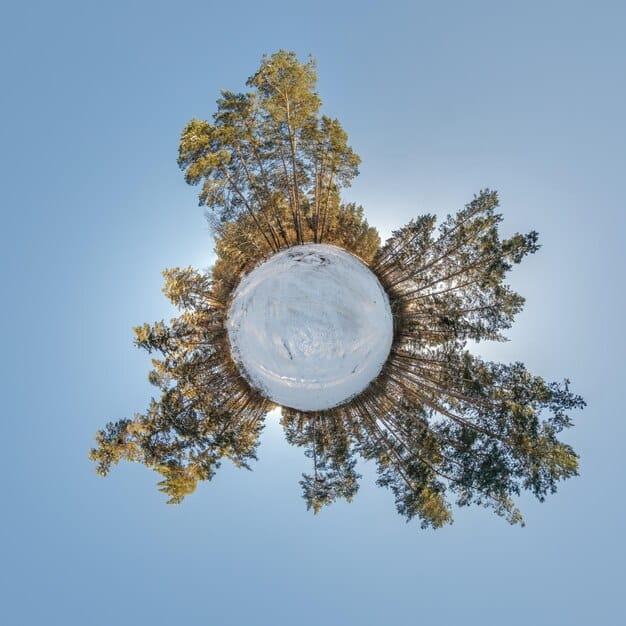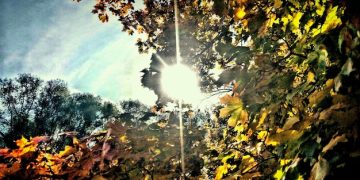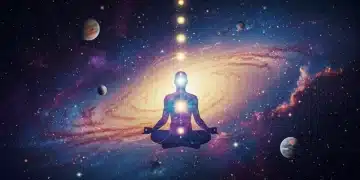The 2025 Winter Solstice: A Guide to Darkness and Introspection

The 2025 Winter Solstice, occurring around December 21st, marks the year’s shortest day and longest night, inviting reflection, introspection, and the embrace of darkness as a time for renewal and setting intentions.
As the days grow shorter and the nights longer, we approach a pivotal moment in the cosmic calendar: the 2025 Winter Solstice: Embracing Darkness and Introspection. This isn’t just a date on the calendar; it’s an opportunity to connect with nature’s rhythms and explore our inner selves.
Understanding the 2025 Winter Solstice
The Winter Solstice is an astronomical event that has been observed and celebrated by cultures around the world for millennia. But what exactly is it, and why is it so significant?
At its core, the Winter Solstice marks the moment when the Earth’s North Pole is tilted furthest away from the Sun. This results in the shortest day and longest night of the year for the Northern Hemisphere, including the United States.
Astronomical Significance of the Solstice
From an astronomical perspective, the Winter Solstice is a turning point. After this day, the days gradually begin to lengthen, and the nights become shorter. This change in daylight hours has a profound impact on the natural world and on human societies.
Cultural and Historical Celebrations
Many ancient cultures recognized the significance of the Winter Solstice and developed their own unique traditions and celebrations around it. These celebrations often involved feasting, rituals, and honoring the return of light.
- Yule: A pagan festival celebrated in Northern Europe, Yule involved feasting, burning a Yule log, and decorating evergreen trees.
- Saturnalia: An ancient Roman festival dedicated to the god Saturn, Saturnalia was a time of feasting, gift-giving, and role reversal.
- Dongzhi Festival: Celebrated in East Asia, the Dongzhi Festival marks the return of longer days and is often celebrated with family gatherings and special foods.

The Winter Solstice is more than just an astronomical event; it’s a time steeped in history and cultural significance, reminding us of our connection to the cycles of nature and the traditions of our ancestors.
The Symbolism of Darkness and Light
The Winter Solstice, with its emphasis on darkness, provides us with a unique opportunity to reflect on the symbolism inherent in both darkness and light. Understanding this symbolism can significantly enrich our experience of the solstice.
Darkness is often associated with the unknown, the hidden, and the introspective. It’s a time when we are forced to turn inward, to confront our fears and uncertainties.
Embracing Darkness as a Time for Introspection
Rather than fearing the darkness of winter, we can embrace it as a time for introspection and self-discovery. It’s a time to slow down, to reflect on our lives, and to identify what we want to change or improve.
The Return of Light: Hope and Renewal
The Winter Solstice also signifies the return of light. After the longest night, the days begin to grow longer, symbolizing hope, renewal, and the promise of new beginnings. This is a time to set intentions for the coming year and to look forward to the future with optimism.
The symbolism of darkness and light during the Winter Solstice offers a powerful metaphor for the challenges and opportunities we face in our lives.
Rituals and Practices for Introspection
To fully embrace the introspective nature of the 2025 Winter Solstice: Embracing Darkness and Introspection, consider incorporating specific rituals and practices into your celebration. These activities can help you connect with the energy of the solstice and gain valuable insights.
Journaling is a powerful tool for self-reflection. Use the darkness of the solstice to explore your thoughts, feelings, and experiences.
Journaling Prompts for the Winter Solstice
Here are some journaling prompts to help guide your introspection during the Winter Solstice:
- What are you grateful for from the past year?
- What challenges did you overcome?
- What are your goals and intentions for the coming year?
- What limiting beliefs are holding you back?
Meditation and Mindfulness
Meditation and mindfulness practices can help you quiet your mind and connect with your inner self. Find a quiet space, close your eyes, and focus on your breath.
Many people find that creating a sacred space can enhance their experience of the Winter Solstice. This could be a corner of your home, a garden, or any place where you feel comfortable and connected to nature.

By incorporating these rituals and practices, you can deepen your connection to the 2025 Winter Solstice: Embracing Darkness and Introspection and unlock valuable insights into yourself and your life.
Connecting with Nature
The Winter Solstice offers an excellent opportunity to reconnect with nature and appreciate its beauty and resilience, even in the depths of winter. Taking time to observe and interact with the natural world can provide a sense of peace and grounding.
Go for a walk in a nearby park or forest. Observe the trees, the plants, and the animals. Notice how they have adapted to the cold and darkness of winter.
Spending Time Outdoors
Even a short walk can be beneficial. Pay attention to the sights, sounds, and smells of the winter landscape. Allow yourself to be present in the moment and to appreciate the beauty that surrounds you.
Observing the Night Sky
The Winter Solstice is also a great time to observe the night sky. The long nights provide ample opportunity for stargazing.
Consider building a bonfire to celebrate the Winter Solstice. A bonfire is a symbol of warmth, light, and community, and it can be a powerful way to honor the return of the sun.
Setting Intentions for the New Year
The 2025 Winter Solstice: Embracing Darkness and Introspection is a potent time for setting intentions for the New Year. As the days begin to lengthen, we can use this energy to plant the seeds of our desires and to manifest our goals.
Take some time to reflect on what you want to achieve in the coming year. What are your dreams? What are your goals? What steps can you take to make them a reality?
Identifying Goals and Desires
Be specific when setting your intentions. Instead of saying “I want to be happier,” try “I want to cultivate more joy in my life by practicing gratitude daily.”
Creating a Vision Board
A vision board is a visual representation of your goals and desires. Create a collage of images, words, and symbols that represent what you want to manifest in your life.
Share your intentions with others. This can help you stay accountable and motivated.
Celebrating with Community
While the Winter Solstice is a time for personal introspection, it’s also a time for community and connection. Celebrating with others can amplify the joy and meaning of the solstice.
Gather with friends and family to celebrate the Winter Solstice. Share a meal, tell stories, and exchange gifts.
Hosting a Solstice Gathering
Consider hosting a solstice gathering at your home. Invite friends and family to celebrate with you. Decorate your home with festive lights and greenery.
Participating in Local Events
Check to see if there are any Winter Solstice events happening in your community. Many cities and towns host festivals, concerts, and other celebrations to mark the solstice.
By celebrating with community, you can share the joy and meaning of the Winter Solstice and create lasting memories.
| Key Element | Brief Description |
|---|---|
| 🌑 Solstice Meaning | Marks the year’s shortest day and longest night, a time for introspection. |
| 🕯️ Rituals & Practices | Includes journaling, meditation, and creating sacred spaces for reflection. |
| 🌲 Nature Connection | Engage with nature by walking, observing the night sky, or building a bonfire. |
| 🌟 Intentions Setting | Define goals, create vision boards, and share intentions to manifest desires for the New Year. |
Frequently Asked Questions
▼
The Winter Solstice marks the day with the shortest period of daylight and longest night of the year, signifying the Earth’s maximum tilt away from the Sun in the Northern Hemisphere. It heralds the return of longer days.
▼
Darkness symbolizes introspection and reflection. It’s an opportunity to turn inward, confront challenges, and understand personal desires and goals before the return of light and new beginnings.
▼
You can engage in journaling, meditation, spending time in nature, setting intentions, or creating a sacred space. These solo activities foster self-reflection and a deeper connection with the solstice energy.
▼
Traditions vary across cultures but may include Yule celebrations with Yule logs and decorated trees, Roman Saturnalia festivals, and East Asian Dongzhi gatherings with family and special foods, all celebrating the return of light.
▼
Reflect on the past year, identify specific goals, create a vision board representing your desires, and share your intentions with others to enhance accountability and manifest your ambitions for the coming year.
Conclusion
The 2025 Winter Solstice: Embracing Darkness and Introspection, provides a unique opportunity for reflection, renewal, and connection. By understanding the symbolism of darkness and light, engaging in meaningful rituals, connecting with nature, setting intentions, and celebrating with community, we can fully embrace the magic of this special time of year and create a brighter future for ourselves and the world.





